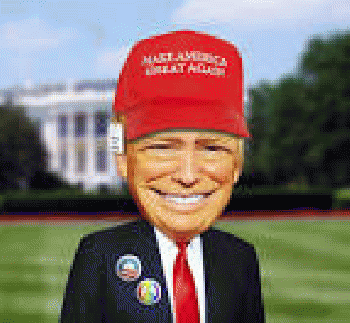Duluth, Minnesota (OpEdNews) July 24, 2018: As everybody knows, Trump's campaign motto was "Make America Great Again." I guess that America was "great" after President Harry Truman dropped atomic bombs on Hiroshima and Nagasaki. No doubt the American men and women who contributed to America's role in the victory in World War II made great contributions -- some sacrificed their lives. Tom Brokaw has dubbed them "the greatest generation." I would argue that the Marshall Plan and the benefits granted to veterans were great.
So during WWII, America emerged as great because so many Americans were unified in making their respective contributions to the war effort. No doubt Axis powers in Germany, Italy, and Japan were a menace. No doubt they needed to be stopped. No doubt communism in the Soviet Union and China was brutal and aspired to world dominance. Trump's campaign motto "Make America Great Again" evokes the anti-communism hysteria of America in the 1950s.
Yes, in the Cold War era after WWII, America embraced anti-communism hysteria. In principle, both Republicans and Democrats, with few exceptions, claimed to be anti-communism. But Republicans liked to criticize Democrats for allegedly being soft on communism. Let us not forget that Senator Barry Goldwater's anti-communism was strident. He was the Republican Party's presidential candidate in 1964. He was a precursor of Trump, and Goldwater's most ardent supporters in 1964 were the precursors of Trump's most ardent supporters in 2016. No doubt Goldwater and his most ardent supporters represented what Richard Hofstadter refers to as the paranoid style in American politics.
For an example of the paranoid style, see Patrick J. Buchanan's book State of Emergency: The Third World Invasion and Conquest of America (New York: Thomas Dunne Books/ St. Martin's Press, 2006).
Now, because Trump's campaign and his presidency tend to amplify tribalism in our contemporary American culture, I want to discuss the American Jesuit theologian John Courtney Murray's 1962 essay "The Return of Tribalism." He was worried that anti-communism hysteria moved the American people toward tribalism.
John Courtney Murray (1904-1967; doctorate in Catholic theology, Gregorian University in Rome, 1937) taught Catholic theology at the Jesuit theologate in Woodstock, Maryland, from the fall of 1937 until his death in 1967 at the age of 63. (In Jesuit parlance, a theologate is a graduate school for Jesuits in training to study theology for four years before they are ordained priests.) Murray served as the editor-in-chief of the Jesuit-sponsored journal Theological Studies from 1941 to his death (from a heart attack). He also served as an associate editor of the Jesuit-sponsored magazine America. In the fall of 1960, He published the book We Hold These Truths: Catholic Reflections on the American Proposition (New York: Sheed and Ward, 1960), a collection of thirteen previously published pieces with an introduction/overview (pages 5-24). This book garnered for Murray a cover appearance and cover story in Time (dated December 12, 1960). This is his most widely known book.
We should not forget that anti-Catholic animus had long been a staple feature of American WASPs. For example, Paul Blanshard's book American Freedom and Catholic Power was first published in May 1949 (the second ed., in 1958). In the 1960 presidential campaign, Senator John F. Kennedy of Massachusetts had to defend his religion.
From colonial times up to, say, 1960, WASPs, and former Protestants, dominated the prestige culture in American culture. Out-groups such as American Catholics tended to produce their own parallel prestige culture.
In the foreword to his 1960 book (pages vii-xii), Murray says, "It is classic American doctrine, immortally asserted by Abraham Lincoln, that the new nation which our Fathers brought forth on this continent was dedicated to a 'proposition'" (page vii) -- "'All men are created equal'" (page viii).
Murray says, "Neither as a doctrine nor as a project is the American Proposition a finished thing. Its demonstration is never done once for all; the Proposition itself requires development on penalty of decadence" (page vii).
Murray says, "What not ought be questioned, however, is that the American Proposition rests on the forthright assertion of a realist epistemology" (page viii) -- not on mere subjectivism and relativism.
For further discussion of realist epistemology, see Martha C. Nussbaum's article "Human Functioning and Social Justice: In Defense of Aristotelian Essentialism" in the journal Political Theory, volume 20, number 2 (May 1992): pages 202-246.
For further discussion of what Murray refers to as "nihilism" and "subjective feeling" (page 12), see Michiko Kakutani's short new book The Death of Truth: Notes on Falsehood in the Age of Trump (New York: Tim Duggan Book/ Penguin Random House, 2018).
In the introduction to his 1960 book (pages 5-24), Murray works with the contrast of the civil multitude locked together in argument characterized by civility v. a mass or a herd or a huddle -- a contrast he claims St. Thomas Aquinas works with "himself giving refined expression to the tradition of classic antiquity" (page 6). The tradition of classic antiquity refers to the Greek contrast of Greek v. barbarian (pages 12-14). I will return to the Greek v. barbarian contrast momentarily.
In accord with the civil multitude v. a mass or a herd or a huddle, Murray says, "Society is rescued from chaos only by a few men [and women], not by the many. . . . It is only the few who understand the disciplines of civility and are able to sustain them in being and thus hold in check the forces of barbarism that are always threatening to force the gates of the City" (page 13).
(Note: You can view every article as one long page if you sign up as an Advocate Member, or higher).





